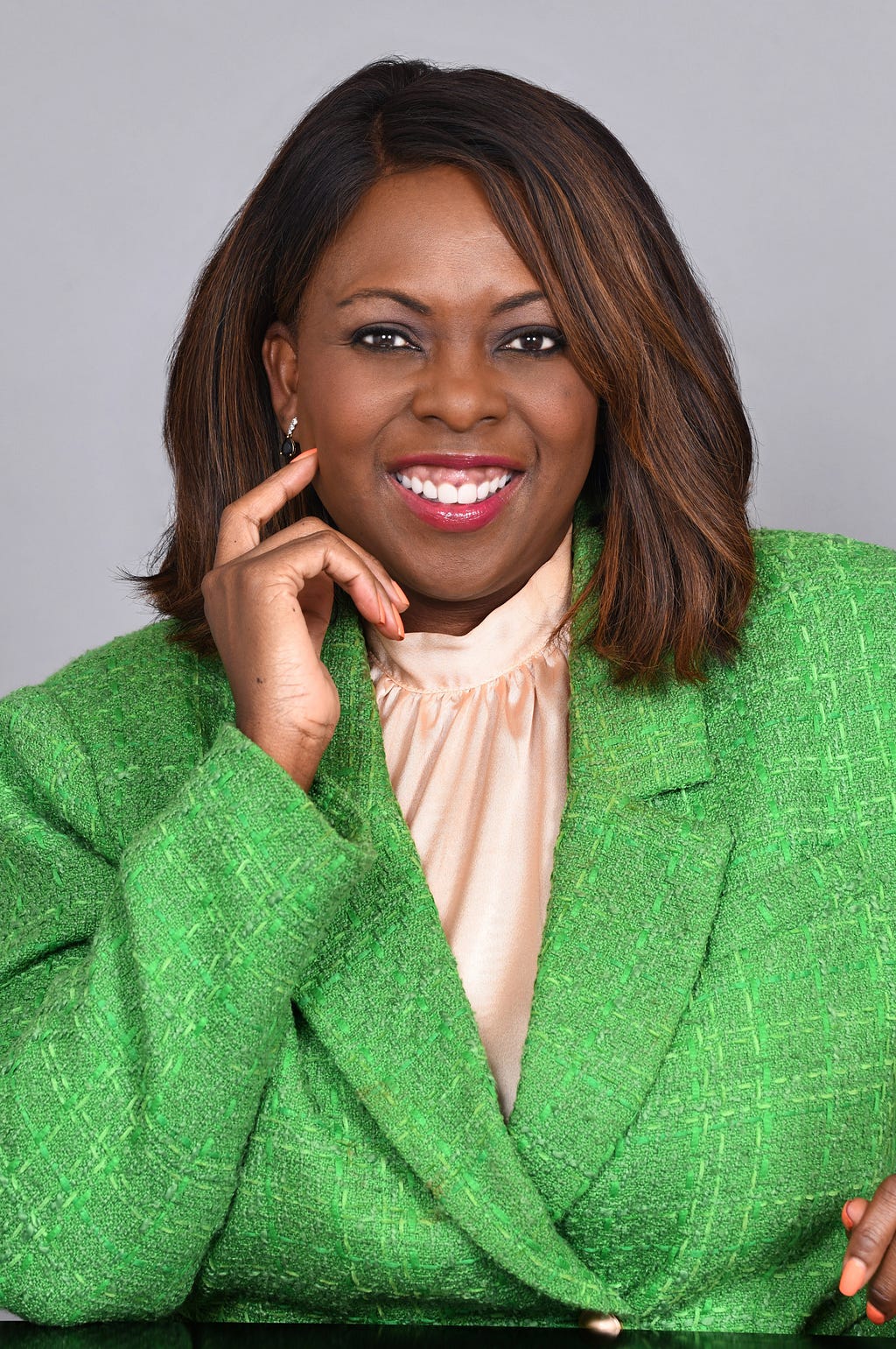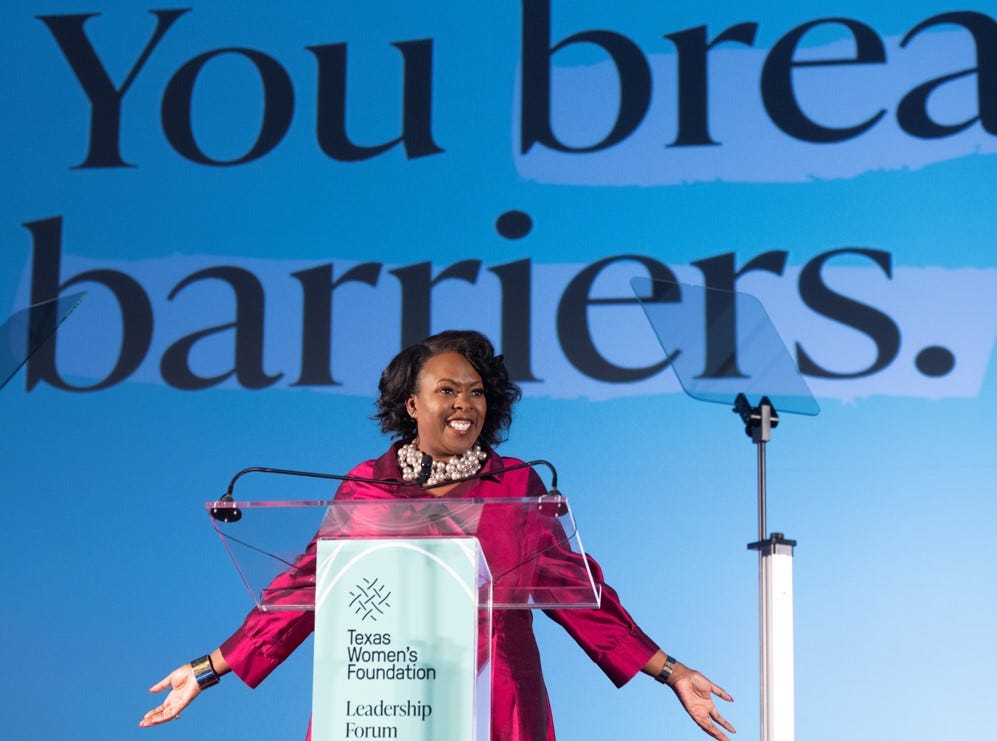Social Impact Authors: How & Why Author Miki Woodard of Texas Women’s Foundation Is Helping To Change Our World

Don’t let others define you. We have an urge to label everyone in our society. If you don’t like the label someone hands you, throw it out and make yourself a different one.
As part of my series about “individuals and organizations making an important social impact”, I had the pleasure of interviewing Miki Woodard.
Miki Woodard was named President and CEO of Texas Women’s Foundation in January 2022. Previously, she served as president of social impact for Bad Robot Productions Inc., as senior advisor of the Katie McGrath and J.J. Abrams Family Foundation, as a global philanthropy VP for JCPenney, and as managing director for Be the Change, Inc.
Thank you so much for joining us in this interview series! Can you tell us a story about what brought you to this specific career path?
My parents set an example of giving, service, and leadership for me and my brother. As students, in their careers, and in their communities, they always went above and beyond. Because these values were instilled in me from my earliest recollections, there wasn’t any particular moment where I stopped and asked myself if I was going to incorporate them into my own life — it was just second nature to emulate my parents.
However, there was a lightbulb moment when I realized I could pursue a career that centered around community. It happened years ago after I ran into my college roommate, who told me she was volunteering as a mentor. I ended up helping her, and during that process it hit me: Community leadership and philanthropy didn’t need to stay on the sidelines of my life, I could pursue these passions as my career. I’m very grateful for the experience of working with my friend and her mentee because it led me to where I am today.
Can you share the most interesting story that happened to you since you began leading your company or organization?
Although I’ve only been at the helm of Texas Women’s Foundation since January, it’s already been an interesting run, largely because I came on board right as we were emerging from the pandemic and trying to figure out a new normal for a still-changing world. So it’s hard to pick just one moment, but if I had to, I’d probably select our Leadership Forum & Awards Celebration, a signature TXWF event that happens each spring. I was at the podium in front of hundreds of women at the first big in-person event the organization had held since 2019, and everyone was waiting to hear more about the future of our Foundation. It was a little scary, but scary in a good way. It was an “I’ve got this” moment where I really felt like I was holding the reins of the organization, and it was invigorating.
It has been said that our mistakes can be our greatest teachers. Can you share a story about the funniest mistake you made when you were first starting? Can you tell us what lesson you learned from that?
A common mistake for younger professionals is to try to do everything. This is especially true for non-profit professionals who are eager to save the world. But as I’ve matured in my career, I’ve learned you should resist the urge to chase squirrels. Clear away the clutter, then zero in on your most important goals and the best ways to achieve them.
Also, don’t linger on your mistakes. Everyone makes them, and most don’t cause serious problems. I don’t really have any dramatic stories to share in this topic area, but a funny moment that comes to mind happened when I was working in a refugee camp years ago. The amazing medical professionals who worked there were shorthanded, so I ended up jumping into scrubs one afternoon and helping with two medical procedures. All I did was just hand the professionals the equipment, so it was all very appropriate and safe. But when it was time to take a group photo of the team who had helped one very grateful patient, it was suggested it might be best if I wore scrubs for the picture, lest the patient become concerned that a philanthropy professional had been working on them. Looking back, I probably should have just bowed out of the picture, but as a team player I tend to say yes when I’m asked to participate!
Can you describe how you or your organization is making a significant social impact?
During our last fiscal year, we invested more than $7 million in solutions-based community programs that elevate Texas women and their families. Our team is proud of this number, but our impact is more than just writing checks (although writing checks for these programs is very important). We also engage in research and advocacy that leads to better awareness and better policies, and we do so by being thoughtful and inclusive in our partnerships and collaborations, and in our work in general.
Can you tell us a story about a particular individual who was impacted or helped by your cause?
When I was researching TXWF in preparation for interviewing for my job, I was struck by the story of one of the women in the “Voices of Texas Women” featured on the TXWF research site. She was a mother of three who didn’t have much in the way of education or job skills. Then she joined a financial literacy program we supported and began to turn things around for herself. Too often marginalized women are written off, but her story proves that many people have the determination to better themselves — they just need access to resources.

Are there three things the community/society/politicians can do to help you address the root of the problem you are trying to solve?
You bet, and here’s the first: Understand that we still have to fight for gender parity. Many people think it was all over when women gained the right to vote, hold office, and open up credit cards in their name, but the fact is that women still lag far behind men in leadership representation and economic security.
Second: Don’t just give lip service to elevating women. If you don’t take action that lines up with your words, those words don’t mean much.
Three: Set an example by demonstrating your support. This can mean sharing a social media post from an organization like ours, emailing your elected officials about important issues, or writing a check in support of gender-lensed philanthropy.
How do you define “Leadership”? Can you explain what you mean or give an example?
I think that leaders are people who leave things better than they found them. They do so by listening at least as much as they talk, empowering others to reach their potential, and guiding and motivating teams in pursuit of goals clearly defined by their leader.
What are your “5 things I wish someone told me when I first started” and why. Please share a story or example for each.
One: As the saying goes, don’t sweat the small stuff. As I look back on so many “problems” I faced when I was younger, I now realize that most of them didn’t really matter.
Two: Don’t downplay your own gifts and influence. Anyone who aspires to make a difference and is willing to work has the potential to achieve big things. (A great book to read in this topic area is John Amaechi’s “The Promises of Giants.”)
Three: Stay positive. Sometimes opportunities arrive disguised as setbacks.
Four: Don’t let others define you. We have an urge to label everyone in our society. If you don’t like the label someone hands you, throw it out and make yourself a different one.
Five: Actively seek out mentors. This is especially important if you’re a woman. You’ll be surprised at how often people will say “yes” when you ask for their help.
You are a person of enormous influence. If you could inspire a movement that would bring the most amount of good to the most amount of people, what would that be? You never know what your idea can trigger. 🙂
There’s a holiday song called “My Grown Up Christmas List” that has a line that goes “Every man (person) would have a friend.” In similar fashion and going back to my earlier “five things” response, I would love for every girl or woman who wanted a mentor to have one. Amazing things happen when women help each other.
Can you please give us your favorite “Life Lesson Quote”? Can you share how that was relevant to you in your life?
I like this quote by Alice Walker: “The most common way people give up their power is by thinking they don’t have any.” It makes me think of the strong women who came before me in my family. They accomplished and managed so much, in spite of the many obstacles facing them as Black women in the 19th and 20th centuries.
Is there a person in the world, or in the US with whom you would like to have a private breakfast or lunch with, and why? He or she might just see this, especially if we tag them. 🙂
I wish you’d asked me about the ten women I’d invite to brunch, because it’s so hard to pick just one. But if you’re making me narrow it down, I’ll go with Sima Sami Bahous, the executive director for UN Women. While our work is focused on Texas, it’s also part of the collective effort to elevate women across the globe. I’d love the opportunity to hear her insights.
How can our readers further follow your work online?
Follow us on Facebook, Instagram, Twitter and LinkedIn, or visit us at txwf.org
This was very meaningful, thank you so much. We wish you only continued success on your great work!
Social Impact Authors: How & Why Author Miki Woodard of Texas Women’s Foundation Is Helping To… was originally published in Authority Magazine on Medium, where people are continuing the conversation by highlighting and responding to this story.
